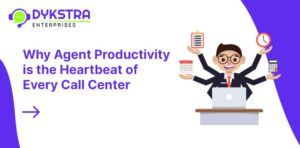
In the fast-paced world of call centers, efficiency is the name of the game. While technology, analytics, and processes are crucial, the true heartbeat of any successful call center lies in one essential element: agent productivity. Productive agents aren’t just the backbone of operations—they’re the force that drives growth, customer satisfaction, and ultimately, the bottom line.
1. Customer Satisfaction: The Top Priority
When customers reach out to a call center, they’re often dealing with issues or concerns that need immediate resolution. A productive agent is equipped with the right tools and knowledge to address these concerns quickly and effectively. In turn, this leads to quicker response times, smoother resolutions, and happier customers.
Every interaction matters, and when agents are operating at their best, customers feel heard and valued. Productivity directly impacts key metrics like First Call Resolution (FCR), which is vital to maintaining high customer satisfaction.
2. Cost Efficiency and Operational Success
Call centers operate in a highly competitive environment, and cost efficiency is critical to their success. Unproductive agents not only waste time but also increase operational costs. On the other hand, when agents perform at peak efficiency, call centers can handle higher volumes of calls without needing additional resources. This results in reduced operational costs and an increase in overall profitability.
High agent productivity also minimizes call wait times, ensuring that the call center can operate at maximum capacity without sacrificing quality.
3. Employee Engagement and Retention
Engagement is key to maintaining a productive workforce. Agents who feel supported, properly trained, and motivated tend to be more productive. When agents are empowered to take ownership of their work, it boosts morale and fosters a positive working environment. This, in turn, reduces turnover rates, as employees feel more connected to their role and the organization.
A call center with a well-trained, motivated, and productive team creates a ripple effect—happy agents lead to happy customers, which ultimately drives success.
4. Streamlining Workflow with Technology
Technological advancements like AI-powered tools, CRM systems, and automated processes are designed to help agents be more productive. When integrated properly, these tools reduce manual tasks, allowing agents to focus on the more complex aspects of customer interactions. By leveraging technology to eliminate bottlenecks, agents can handle more calls with greater accuracy and speed, increasing overall efficiency.
5. The Impact on Revenue
Productive agents don’t just resolve issues—they can also upsell or cross-sell products and services during their interactions. This boosts revenue and helps the company achieve its sales goals. The more productive an agent, the more opportunities there are for generating additional income streams.
6. Continuous Improvement: Training and Development
A major driver of agent productivity is ongoing training and development. By continuously upgrading their skills and staying updated on company policies, agents can become more efficient at solving problems. Regular training sessions also allow agents to stay ahead of the curve, especially in a constantly evolving industry like customer service.
Conclusion
In the end, the success of every call center boils down to how productive its agents are. Agent productivity is the heartbeat that drives customer satisfaction, reduces costs, boosts employee engagement, and even generates more revenue. By investing in the tools, training, and technology that empower agents, call centers can stay competitive, efficient, and customer-centric.
